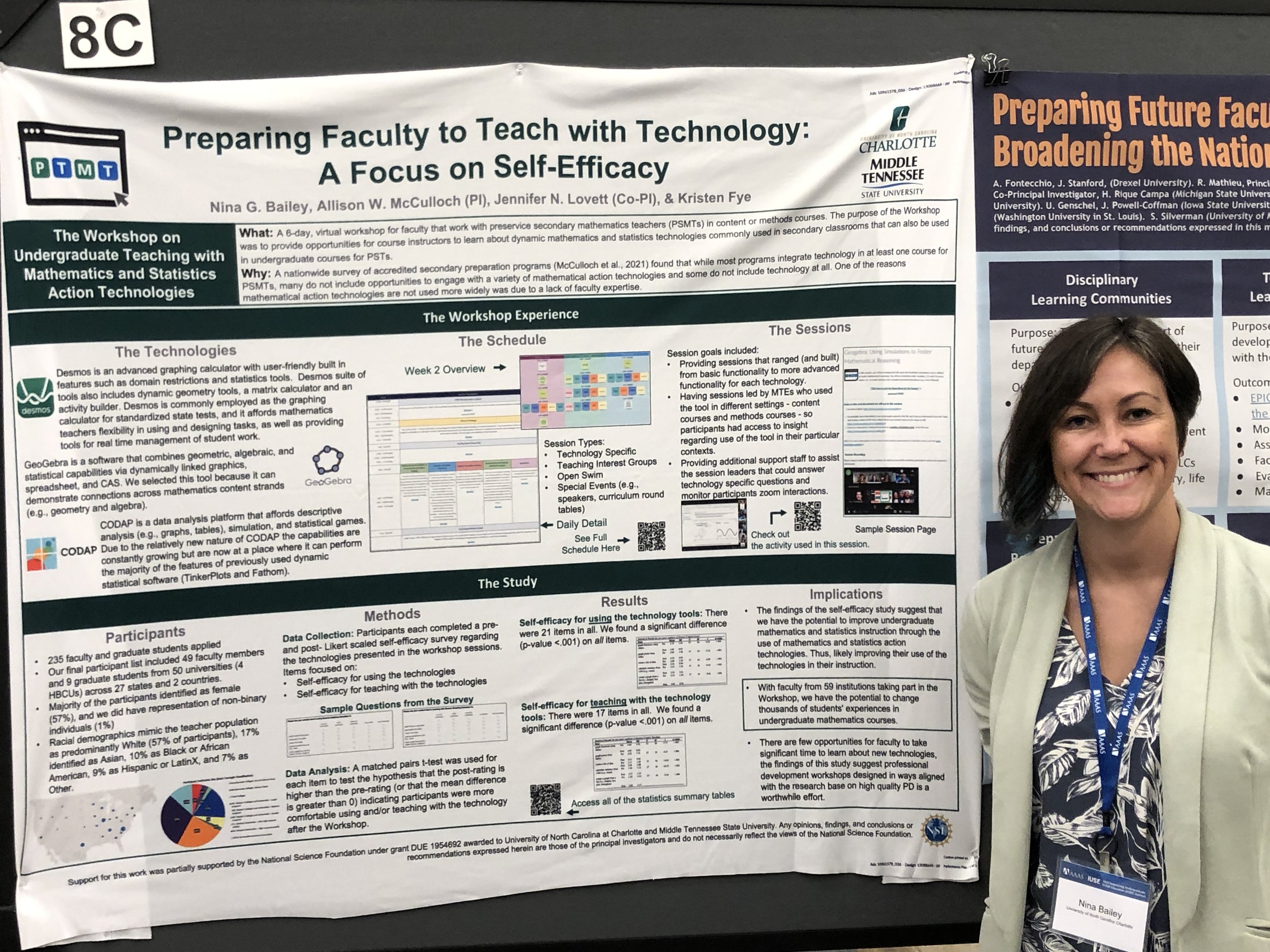Building Teacher Educators’ Confidence with Mathematics and Statistics Action Technologies
By Erin Moss, Co-Editor, DUE Point, Millersville University
From Allison NcCulloch, PI: “This is Nina Bailey–one of the GRAs that worked tirelessly to make this project a success!”
Faculty who prepare preservice secondary mathematics teachers (PSMTs) are not always familiar with or confident utilizing the software those teachers may soon encounter in their own teaching. Dr. Allison McCulloch serves as the Principal Investigator on an NSF DUE-funded project that helps teacher educators get up to speed on mathematical action technologies like Desmos, GeoGebra, and CODAP. The project involved the design and implementation of a six-day virtual workshop for around 70 faculty from across the United States that work with PSMTs in content or methods courses. The workshop provided opportunities for course instructors to learn about and use dynamic mathematics and statistics technologies commonly used in secondary classrooms so that they can integrate them into undergraduate courses for PSMTs. Below, Allison gives us some more details about the project.
What challenges in preservice mathematics teacher education are you trying to address with your workshop?
We completed a nationwide survey of accredited secondary preparation programs in 2018 that helped us assess the status of technology use in preservice mathematics teacher education. We found that while most programs integrate technology in at least one course for PSMTs, many do not include opportunities to engage with a variety of mathematical action technologies, and some do not include technology at all. One of the reasons mathematical action technologies are not used more widely is a lack of faculty expertise. The results of this survey led us to the idea of a workshop for faculty that teach the different types of courses in which PSMTs are intended to learn about teaching with technology.
What particular action technologies are addressed in the workshop, and how do you help mathematics education faculty develop expertise with it?
We elected to focus on Desmos, GeoGebra, and CODAP because they are free, work on any platform, and are appropriate for use in both high school and undergraduate mathematics courses. They are the most commonly used technologies in high schools across the country and incorporate dynamic graphing and geometry, computer algebra systems, and data analysis tools.
For each of the technologies, we invited experts to collaborate to design and lead the workshop sessions. Our session goals included:
providing sessions that build from basic functionality to more advanced functionality for each technology;
selecting math teacher educators experienced with the chosen technologies in content and/or methods courses to lead each session; and
employing additional support staff to assist the session leaders in answering technology-specific questions.
Large projects seldom go exactly as planned. What are some of the biggest surprises you’ve faced with your work on this project?
We originally proposed this to be a 2.5-day face-to-face workshop. When it became clear that we would not be able to do the workshop face-to-face, we had to rethink our original plans completely! In moving online for the workshop, we needed to make sure participants wouldn’t be sitting in front of their computers for too long. Other considerations included accounting for participants working in different time zones, allowing time for participants to reflect on what they were learning, and supporting community building and networking, which we felt was very important for their future use of tech in their courses. So as you can imagine, we had to do a complete overhaul of the original plans.
There is an evaluation component to your project as well as the design aspect. Can you share some of the outcomes that you are studying and some preliminary results?
Our evaluation focused on faculty self-efficacy in using the three technologies in their own mathematical / statistical work and their self-efficacy in using the technologies in their teaching. We included 21 items in our assessments related to using the technologies and 17 items related to teaching with the technologies. We found a significant difference on all items from pre-workshop to post-workshop.
In addition, on a survey we sent out about 3 months after the workshop, the 42 participants that responded all indicated they were either a) using at least one of the technologies in a course they were teaching in the semester following the workshop or b) were not currently using any of the technologies because they did not align with course goals, but planned to use them in a different course in the following semester.
We also performed a general evaluation of the workshop experience, surveying participants about the organization, sessions, and leadership team. Results indicated that the participants on the whole “agree” to “strongly agree” that the workshop was well organized, sessions were helpful and interesting, leaders were knowledgeable, and that they would both choose to participate again and recommend the workshop to peers. Participants that responded to the open-ended questions were overwhelmingly positive about their experience in the workshop.
Despite the positive feedback, there were important points that we would consider in planning for future workshops of this type. For example, a few faculty noted that they were overwhelmed by the amount of information and would have rather focused on just one technology. In contrast, a few others noted they would have liked more advanced sessions. We did the best we could to balance the needs of the many different backgrounds participants had, but we did tend to lean toward making decisions that supported those with little to no experience with the technologies. Not surprisingly, many noted they would have preferred the workshop to be in person.
We are considering proposing a project to NSF to repeat the workshop in a face-to-face format. We are hearing that there is interest from both participants and applicants that were not selected to participate.
Learn more about NSF DUE 1954692
Full Project Name: Workshop on Undergraduate Teaching with Mathematics and Statistics Action Technologies
Abstract: https://www.nsf.gov/awardsearch/showAward?AWD_ID=1954692&HistoricalAwards=false
Project Contact: Dr. Allison McCulloch, PI; amccul11@uncc.edu

